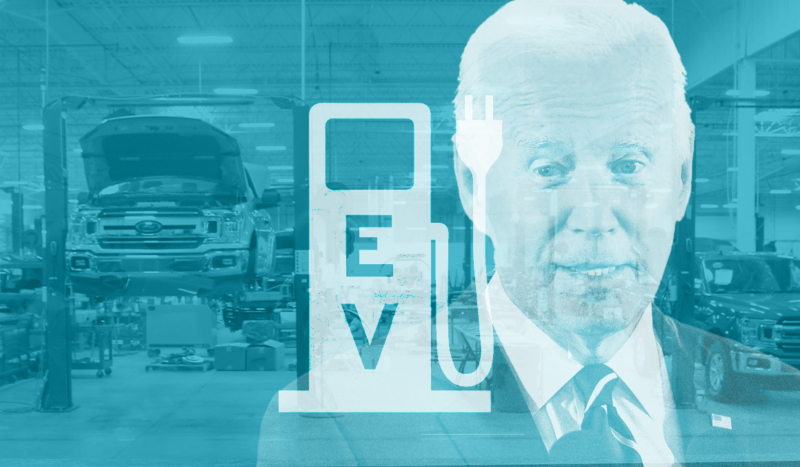EV Mandate Opposition: Car Dealers Renew Their Fight

Table of Contents
Dealership Preparedness for EV Sales
The successful transition to EVs requires a robust infrastructure and skilled workforce to support sales and service. Unfortunately, many dealerships are ill-equipped to handle the demands of an EV-dominated market.
Lack of Infrastructure and Training
- Insufficient charging infrastructure: Many dealerships lack the necessary charging stations to support EV sales and service, hindering their ability to showcase and maintain EVs effectively.
- Lack of qualified EV technicians: Specialized training is required to diagnose and repair EV components, and a shortage of qualified technicians is a major obstacle.
- Limited consumer understanding of EV technology: Many consumers remain unfamiliar with EV technology, its benefits, and potential drawbacks. Dealerships need resources to educate consumers effectively.
Many dealerships are struggling to adapt. The lack of readily available charging infrastructure, coupled with a shortage of trained technicians capable of handling complex EV repairs, creates a significant barrier to entry for EV adoption at the dealership level. This lack of preparedness prevents dealers from adequately meeting potential customer demand and capitalizing on the burgeoning EV market.
Inventory Management Challenges
- Uncertainty in EV demand forecasting: Predicting future EV demand is difficult, making inventory management a significant challenge. Overstocking can lead to financial losses, while understocking can result in lost sales.
- High initial cost of EVs: The higher upfront cost of EVs compared to gasoline-powered vehicles increases the financial risk associated with holding EV inventory.
- Limited EV models available: The current range of available EV models might not meet the diverse needs and preferences of all consumers.
The challenges extend beyond simply having EVs on the lot. The high upfront investment needed for EV inventory, coupled with the unpredictable nature of demand, forces dealers to carefully manage their financial resources. The limited availability of diverse EV models further complicates the process, preventing them from catering to the full spectrum of consumer preferences.
Consumer Concerns and Market Readiness
While the push for EVs is environmentally sound, addressing consumer concerns is crucial for widespread adoption.
Range Anxiety and Charging Infrastructure Concerns
- Fear of running out of battery power: Range anxiety remains a significant barrier to EV adoption. Consumers worry about the availability of charging stations during long journeys.
- Limited public charging options: The lack of a comprehensive and reliable public charging network further exacerbates range anxiety. Charging times are often significantly longer than refueling a gasoline car.
- Long charging times: The time required to fully charge an EV is considerably longer than filling a gas tank, causing inconvenience for many consumers.
Consumer adoption of EVs is directly linked to the existence of a robust charging infrastructure. Until range anxiety is adequately addressed through widespread and readily accessible charging stations, full-scale EV adoption will likely remain hindered.
Affordability and Purchase Price Obstacles
- High initial cost of EVs: The significantly higher initial cost of EVs compared to gasoline-powered vehicles remains a major deterrent for many potential buyers.
- Limited government incentives: Government incentives, while helpful, often aren't sufficient to offset the high purchase price, making EVs inaccessible to a large segment of the population.
- Lack of accessible financing options: Securing financing for EVs can be more challenging than for gasoline vehicles, creating additional hurdles for potential buyers.
The price disparity between EVs and internal combustion engine (ICE) vehicles continues to be a significant barrier. Many potential buyers are priced out of the market due to the high initial cost and limited access to affordable financing options, despite government incentives aimed at making EVs more attainable.
Economic Impacts on Dealerships and the Automotive Industry
The transition to EVs has significant economic implications for dealerships and the wider automotive industry.
Potential Job Losses and Economic Disruption
- Reduced demand for gasoline-powered vehicles: A rapid shift to EVs could dramatically reduce the demand for gasoline-powered vehicles, resulting in job losses across the industry.
- Job losses in related industries: The transition will impact related industries, including parts manufacturing, repair shops, and fuel distribution networks.
- Potential negative impact on rural communities: Rural communities heavily reliant on the automotive industry could be disproportionately affected by job losses and economic downturn.
The economic consequences of a sudden shift to EVs need careful consideration. Job losses across the automotive industry and associated sectors could have devastating consequences for many communities and individuals. A more gradual transition, supported by retraining initiatives and economic diversification strategies, is essential to mitigate these impacts.
Unrealistic Sales Targets and Government Regulations
- Mandated sales targets that outpace market readiness: Many dealers feel that the mandated sales targets for EVs are unrealistic and do not reflect the current market conditions.
- Increased regulatory burdens: The increased regulatory burden associated with selling and servicing EVs adds to the financial and operational challenges facing dealerships.
- Lack of government support for dealership transitions: Dealerships need more government support to invest in the necessary infrastructure and training to effectively sell and service EVs.
Dealers argue that the government's approach lacks a realistic understanding of the challenges they face. The current pace of EV mandate implementation, combined with insufficient government support, places undue stress on dealerships and threatens their economic viability.
Conclusion
The opposition to EV mandates from car dealers is not a rejection of electric vehicles, but rather a plea for a more measured and realistic approach to their adoption. Addressing dealership preparedness, consumer concerns, and the potential economic disruptions is vital for the successful transition to a sustainable automotive future. The ongoing fight against these electric vehicle mandates necessitates a collaborative effort involving governments, automakers, and dealerships. Finding a balance between environmental goals and the economic well-being of communities dependent on the automotive industry is essential. A sensible pathway to electric vehicle adoption must address the concerns surrounding EV mandate opposition to create a healthy and sustainable market.

Featured Posts
-
 Flooding A Grave Threat To Livestock And Farms
May 07, 2025
Flooding A Grave Threat To Livestock And Farms
May 07, 2025 -
 Nhl A Svetovy Pohar 2028 Boj O Ucast Slovenska
May 07, 2025
Nhl A Svetovy Pohar 2028 Boj O Ucast Slovenska
May 07, 2025 -
 Anthony Edwards And Barack Obama A Conversation On Leadership
May 07, 2025
Anthony Edwards And Barack Obama A Conversation On Leadership
May 07, 2025 -
 Ryujinx Emulator Project Ends After Reported Nintendo Communication
May 07, 2025
Ryujinx Emulator Project Ends After Reported Nintendo Communication
May 07, 2025 -
 Hawkgirls Flight And Costume An Actors Perspective On Superman
May 07, 2025
Hawkgirls Flight And Costume An Actors Perspective On Superman
May 07, 2025
Latest Posts
-
 Capacites Cognitives Superieures Des Corneilles Une Etude De Cas En Geometrie
May 08, 2025
Capacites Cognitives Superieures Des Corneilles Une Etude De Cas En Geometrie
May 08, 2025 -
 Etude Scientifique Sur Les Capacites Geometriques Des Corneilles
May 08, 2025
Etude Scientifique Sur Les Capacites Geometriques Des Corneilles
May 08, 2025 -
 The Lasting Legacy Of Counting Crows Saturday Night Live Appearance
May 08, 2025
The Lasting Legacy Of Counting Crows Saturday Night Live Appearance
May 08, 2025 -
 La Geometrie Chez Les Corneilles Une Performance Cognitive Remarquable
May 08, 2025
La Geometrie Chez Les Corneilles Une Performance Cognitive Remarquable
May 08, 2025 -
 Comparaison De Capacites Geometriques Corneilles Vs Babouins
May 08, 2025
Comparaison De Capacites Geometriques Corneilles Vs Babouins
May 08, 2025
